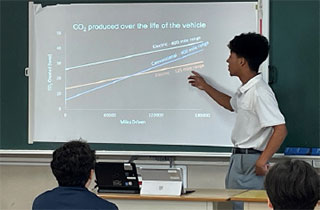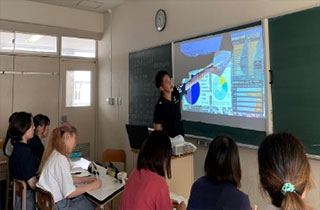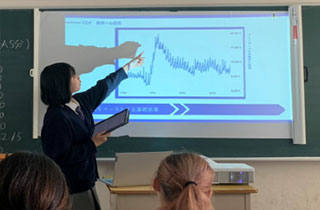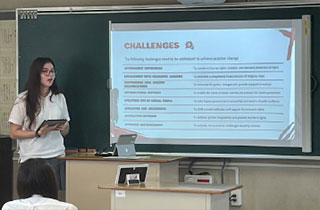International Understanding Studies / Theme Study
International Understanding Courses
Many schools have been educating students for international understanding through various kinds of international events. The most prominent feature of our school is that we strategically organize a curriculum to develop students international understanding through necessary knowledge, and skills in our daily class activities.
Classes are well organized for each subject. Students are asked to write a report, or participate in practical exercises and study. We invite specialized researchers, business people and so forth to make the classes more interesting and attractive. Teachers and students work hard together in creating this special class style.
The curriculum is divided into three areas of cultural understanding, social understanding and environment & communication arts.
Required courses are colored in blue and elective courses are colored in black.
| Area | Subject | Contents |
|---|---|---|
| Cultural Understading |
Geography for Cultural Understanding |
To learn about the relationship between humanity and culture by introducing international society and culture; to understand cultural diversity and progress of society. |
| Japanese Culture | To learn about Japanese traditional and modern culture from various points of view | |
| Traditional Performing Art |
This is a very special occasion which students can learn about Noh from a well known Noh teacher. Students can dance and chant at the Noh stage of Omotesando at the end of the school year - an outstanding class idea of our school. |
|
| Japanese Traditional Martial Arts |
To learn the martial arts, gymnastics and sports culture that originated in Japan. | |
| World Literature | To appreciate various styles of literary works such as mythology, folktales, masterpieces around the world, juvenile literature and Shakespeare. | |
| Social Understanding |
International Relations |
Understanding the progress of international politics and economics after the war by deepening students understanding of international issues. |
| Social Issues | Through the discussions and lectures by specialists or tours of related facilities with themes of human rights and social issues, students are to contemplate on how to live in today's complicated society in terms of human rights. | |
| Area Studies | Students deepen their understanding of an area through various aspects of urban function and regional tasks by researching around our school and Shibuya through field work. | |
| Social Welfare | Students learn about welfare issues through facility visits and workshops on home-welfare, disability and elderly care. | |
| Environment & Communication Arts |
Environmental Relations |
Students study overall global environment issues to achieve the basic knowledge of natural science. |
| Communication | To develop the ability to express oneself by studying interpersonal, cross-cultural and mass communication in workshops. | |
| Visual Media A | Students practice and study about theories of photography, techniques for taking photos and editing by using digital cameras. | |
| Visual Media B | Students practice editing techniques on computers for photos taken by digital video cameras. Students learn various kinds of theories related to image expression through production. | |
| Dramatic Arts | Students practice vocal training, body expressions, improvised acting as well as makeup and how to wear Kimono. |
Theme Study
“Theme Study” is a research and inquiry activity in which students conduct surveys, observations, and experiments on a research theme they have chosen for themselves, and logically present their own ideas and arguments based on the facts they have obtained from their investigations. While getting advice from the teacher in charge, each student will work on two themes; one in the second year and one in the third year.
Students will also give presentations on their research results and practice communicating their arguments to others in an easy-to-understand manner.
“Theme Study” has been conducted since the founding of the school, and students are required to carry out independent and voluntary activities outside of school hours./p>
Examples of recent themes
"The Need for Disaster Prevention Education in Schools," "Lowering the Age of Application of Juvenile Law" "Considerations on Biodiversity: What is Biodiversity" "The Reality of Homelessness" "The Relationship between African American Identity and Hairstyles" "Blood Donation and the SDGs" "Research on the Nature of ʻTaʼ " "Will MMT Eliminate Economic Disparities?" "Animal Testing in the Cosmetics Industry" "The Reality of Food Loss and What We Can Do About It"





